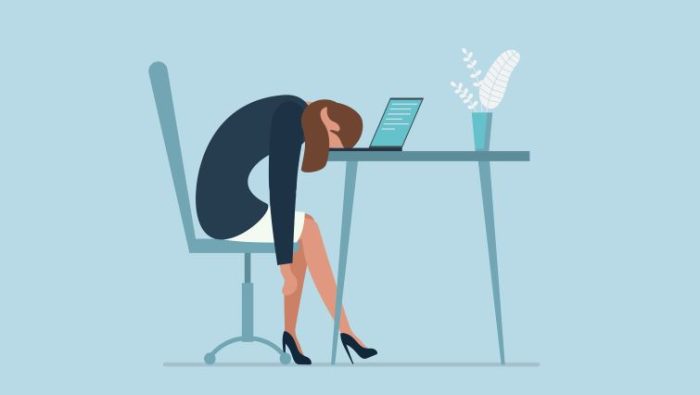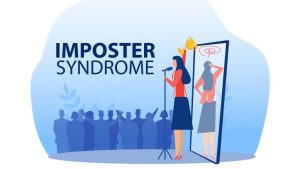What Is Work Fatigue and How Can You Spot Early Signs?
 Publié le 21 September 2021
Publié le 21 September 2021
Fatigue is more than just being tired, and work-related exhaustion is a serious issue faced by employees in all different types of industry. If you are wondering what is work fatigue and how can you spot early signs, learning more is important for employees and employers alike.
We’ve all dealt with the stress of long hours and heavy workloads at work. But when these stressors are present for an extended period of time, they can start to negatively impact your health.
Work fatigue is more than simply feeling tired – it can affect your mental and physical health and is a known risk factor in workplace accidents. Spotting the signs of workplace fatigue early can help in the treatment and prevention of this problem.
What Is Workplace Fatigue?
One of the most common and, unfortunately, dangerous risks to an employee’s health and safety is workplace fatigue. In fact, studies suggest that it costs employers an average of $136 billion a year in health-related productivity loss. Fatigue is described in terms of excessive tiredness or exhaustion, and it can impact an employee’s productivity and motivation, in addition to negatively affecting their ability to focus and concentrate.
In work environments that require the use of heavy machinery or potentially hazardous equipment, fatigue is not only an inconvenience, but can pose a safety threat. Work fatigue is more than simply feeling sleepy – while your sleep habits can play an important role in your overall well being, the symptoms of workplace fatigue are usually more complex than this alone.
It may be a mental health issue such as stress, depression or anxiety that’s leading you to struggle at work, or you might be over-exerted from consistent long hours and tight deadlines. Work fatigue affects you mentally and emotionally, in addition to physically.
If you work irregular hours, such as night shifts, this can increase the risk of developing burnout and fatigue, while people who travel regularly for work also face higher odds of dealing with the issue of work fatigue.
Signs Of Fatigue
Work fatigue can manifest in a variety of ways, causing different problems in different people. If you’re still experiencing some of the below symptoms, it could be a sign of work fatigue.
Common Symptoms of Work Fatigue:
- Chronic tiredness or sleepiness
- Muscle weakness or soreness
- Headaches
- Dizziness
- Reduced reflexes and responses
- Difficult making decisions or judgments
- Blurred vision
- Poor concentration
- Reduced immune system functioning
- Irritability or moodiness
- Inability to pay attention or focus
Symptoms Of Burnout At Work
A connected issue to workplace fatigue is job burnout, and this can come from work-related stress, dysfunctional work environments, and a lack of support from managers and colleagues, among other factors.
If you’re spotting the major signs of burnout, your work fatigue could be connected to the stress and anxiety of your current workplace situation.
Burnout can look like:
- Feeling disillusioned at work
- Impaired judgment
- Difficulty concentrating
- Being irritable or short-tempered with colleagues and clients
- Lacking satisfaction in your work achievements
- A change in sleeping habits, either sleeping too much or too little
- Using food, alcohol or drugs to cope with how you’re feeling
The Risks Associated With Work Fatigue
Fatigue in the workplace impacts a staff member in several ways. Firstly, it can reduce one’s cognitive functioning and mental capacity. It can leave you feeling physically and mentally exhausted, as well as drowsy. It also results in slower reactions, memory lapses and absent-mindedness, reduced coordination, and decreased awareness of your surroundings. And in a workplace environment, this not only puts your own health and wellbeing at risk but also those around you.
Chronic tiredness in the workplace can increase the risk of accidents, due to a lack of alertness or focus, and it can also mean that operating machinery, vehicles or equipment becomes challenging or even impossible to do safely. If you’re undertaking critical tasks that necessitate a high level of concentration and you’re feeling the effects of work fatigue, it can be hard to achieve this, which can negatively impact the standard of your work.
How To Handle Workplace Fatigue
It is possible to combat work fatigue through changes in your work habits, personal life and your surrounding environment.
Support your body with food, water and sleep
Experts recommend practicing good sleep hygiene as a way of tackling this issue, which means creating an environment that’s most conducive to a good night’s sleep. Avoid stimulants before bed, switch off your phone and laptop a few hours before going to sleep, and try to sleep and wake up at a consistent time, to get your body in the habit.
Good hydration and fueling your body with plenty of nourishing foods will also help to improve your energy levels and brain function. Drinking enough water both at home and at work is a relatively simple way that people can give their bodies a boost. Of course, workplace fatigue is a complex multifaceted issue and it is very possible to maintain positive physical habits and still experience the symptoms.
Move often
If you spend a lot of time sitting in the same position for hours at a time, such as those working in an office sitting at a desk, it can make your body feel sluggish and tired. It can also lead to physical issues such as muscle soreness, joint pain and even pinched nerves.
Try to incorporate ergonomic exercises throughout the day to ward off tiredness and try to get up from your desk and walk around at least once an hour to get your body moving.
Maintain work-life boundaries
If you’re taking on too much work without sufficient breaks to switch off, your body and mind are going to become exhausted. It’s important that you take regular breaks throughout the day, where you step away from your work and get some fresh air if possible, as well as spending time relaxing and unwinding when you go home. If you’re constantly answering emails and calls, or thinking about work when you should be focusing on rest, your mind is never given the chance to relax. The vast increase of people who are now working from home has made maintaining a separation between work time and personal time much more difficult. Employees and company leaders must work together to address this issue and find ways to adapt the new remote work environment in ways that help acknowledge and address this difficulty.
Ask for support
It can be incredibly stressful if you feel overwhelmed at work and like you’re carrying the burden of multiple projects on your shoulders. If this is contributing to your workplace fatigue and burnout, it’s time to speak to your manager or supervisor and explain that you need more support. Ensuring that employees have access to the resources and benefits they need to address issues related to emotional and mental well-being is very important. Employees should be fully aware of these support and always be encouraged to seek help and assistance when they need it.
By starting an opening dialogue with managers and supervisors, there may be ways to change your workload so you have a better balance. It is highly likely that other colleagues are also dealing with fatigue and stress, so by working together and supporting each other by adjusting the workload and re-distributing tasks, it can help to address an entire workplace that is feeling overworked.
Take up a relaxing activity
Everyone should have hobbies and pastimes that they find relaxing. Having an activity you can turn to will help achieve a healthy work-life balance and often will have a direct impact on your mental wellbeing.
Regardless of your age or fitness ability, exercise can be a powerful tool when looking for ways to manage and improve your mental wellbeing. Research suggests the positive effect of being active outside of work can include; increased energy levels, improved brain health and memory, reduces the risk of chronic disease, combates sleep disorders, and increases the production of endorphins – triggering feelings of positivity in the body.
The following activities are all low impact but have a wonderful effect on the mind:
- Yoga
- Gentle walking
- Golf
- Swimming
Finding an activity that is not too taxing on your body physically but gives you a chance to unwind and calm your mind is a great way to combat fatigue.
Final Thoughts
Understanding the signs of work fatigue can help you identify them early and take appropriate action, before the issue becomes too problematic. This action may be asking for more help at work, taking more breaks and time off from your work responsibilities, or taking the opportunity to address habits that may be negatively affecting your overall well-being. Work fatigue is a very serious issue that can affect employees in all industries. People need to be prepared to address and deal with it in order to create a stronger and better work environment for everyone.







